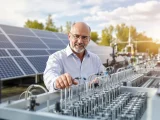
Honda Teams Up with Yamaha, Kawasaki, and Suzuki to Ignite Hydrogen Motorcycle Future, while testing materials in the ISS
April 11, 2025In a bold move toward a cleaner future, Honda R&D has teamed up with fellow motorcycle heavyweights Yamaha, Kawasaki, and Suzuki to bring hydrogen-powered engines to bikes. This historic partnership—called the Hydrogen Engine Consortium—could completely reshape the motorcycle landscape, especially as Japan doubles down on its goal to decarbonize transportation. Meanwhile, Honda isn’t just thinking locally—or even globally. The company is testing advanced materials on the International Space Station (ISS), chasing innovations that could fuel the next generation of mobility tech.
Project/Initiative Details
The newly launched Hydrogen Engine Consortium is all about collaboration. By bringing together Honda, Yamaha, Kawasaki, and Suzuki, Japan’s biggest bike brands are working on hydrogen-powered combustion engines made specifically for motorcycles. It’s a space that hasn’t seen the same green revolution as cars—at least, not yet. But this effort could change all that. The companies are pooling their know-how around engine engineering and emissions control to carve a path toward street-ready, low-emission two-wheelers.
On top of that, Honda R&D is literally taking its research to new heights—by launching a project onboard the ISS. The idea? Study how certain materials behave in microgravity. This could unlock better hydrogen storage, improve fuel cell durability, and fine-tune components for all sorts of future vehicles. Believe it or not, the lessons learned in orbit might be what give hydrogen motorcycles—or even home energy systems—that extra edge they need.
Short- and Long-Term Implications
In the short term, the Hydrogen Engine Consortium might roll out concept bikes that help cut urban emissions—especially in places where motorcycles are the go-to transportation. In the long run, this alliance could set the gold standard for hydrogen motorcycles and even spark innovation in related sectors like marine transport or off-road construction vehicles.
For Honda, combining breakthroughs from space with developments back on Earth could offer a serious edge. If the ISS experiments lead to better materials for hydrogen storage and energy conversion, we might see them show up in bikes, cars—or even fuel cells for homes.
Challenges and Opportunities
Hydrogen supply chains are still pricey and underdeveloped, especially when it comes to powering smaller vehicles like motorcycles. Refueling infrastructure is limited, and making engines hydrogen-ready requires complex engineering. Still, those hurdles create room for innovation—like portable refill stations, new engine designs, or lighter and safer hydrogen tanks built just for bikes.
Meanwhile, the ISS research comes with its own set of challenges—not the least of which is the cost. But the potential payoff? Huge. Testing materials in space could lead to breakthroughs in corrosion resistance, thermal performance, and storage efficiency—all of which directly impact how practical and safe hydrogen becomes in everyday life.
About Honda R&D
Honda R&D Co., Ltd., based in Japan, is the research and development arm of Honda Motor Co., Ltd. Since its founding in 1960, the company has been a trailblazer in cutting-edge automotive tech, from electrification to alternative fuels. In recent years, Honda R&D has zeroed in on hydrogen innovation—and they’ve got big plans to hit carbon neutrality by 2050.



 With over 15 years of reporting hydrogen news, we are your premier source for the latest updates and insights in hydrogen and renewable energy.
With over 15 years of reporting hydrogen news, we are your premier source for the latest updates and insights in hydrogen and renewable energy.